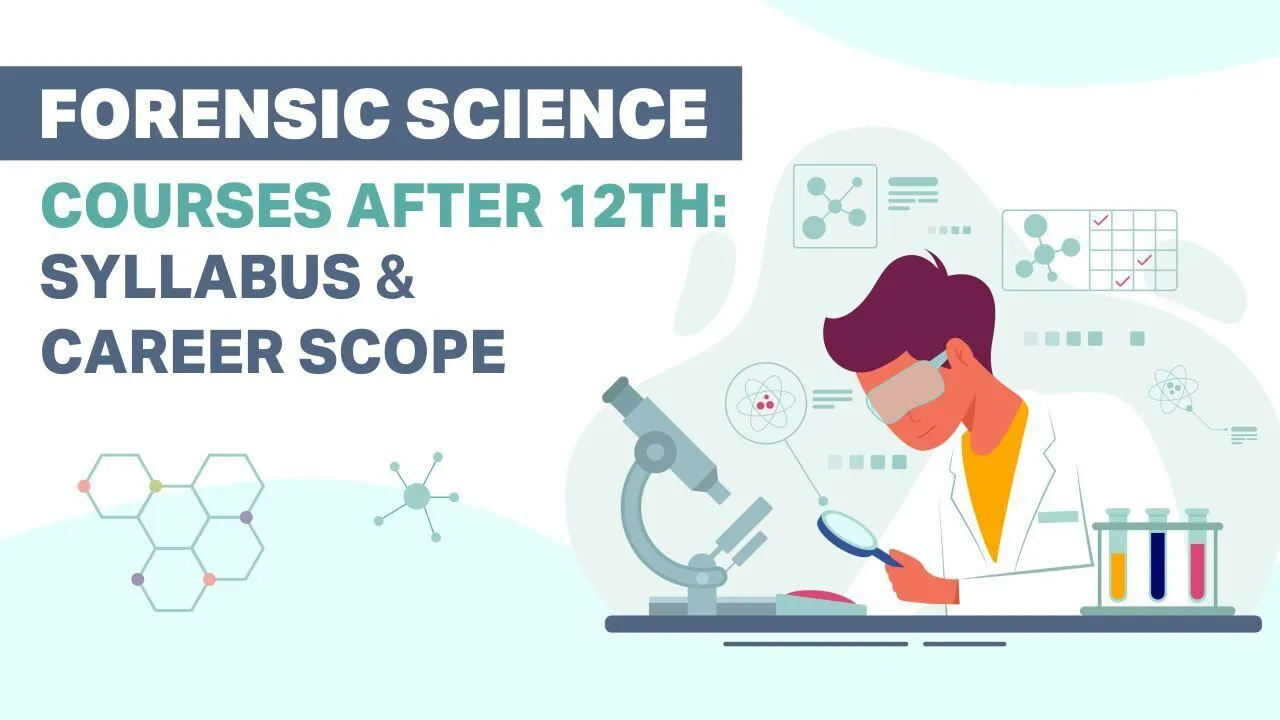
Forensic Science Courses After 12th: Syllabus & Career Scope
Forensic science courses after 12th? Are you passionate about solving crimes? But the question is how you would do this. By pursuing a BSc forensic science Course. That’s right. Because it’ll expertise you in the scientific process of analyzing evidence.
Have you seen forensic experts on famous TV shows? Providing justice to the victim. But how do they do it? Forensic experts combine scientific expertise with investigative techniques. Moreover, they reconstruct events, provide expert testimony, and aid crime investigations.
Since you’re investing in becoming one. So, read this blog that talks about forensic science studies and its career prospects.
Forensic Science Course Eligibility?
Candidates seeking admission to forensic science courses after 12th must fulfil two criteria:
- Must have completed the 12th examination or an equivalent in the Science stream.
- Have achieved a minimum of 50% aggregate marks.
It is crucial to first read the eligibility criteria before pursuing the BSc forensic science course.
What is a BSc Forensic Science Course?
BSc Forensic Science is a 3-year undergraduate degree that educates in both criminalistics and laws. Moreover, It covers disciplines such as biology, chemistry, physics and various others. Studying these modules helps in developing skills in evidence collection, analysis, and presentation. It also provides students with the opportunity to pursue careers in fields such as cybersecurity, education, crime investigation, law enforcement agencies, and government departments.
B.Sc Forensic Science Subjects
Forensic science studies cover a wide range of subjects that upskill students to pursue careers in diverse fields. In addition, it enables to gain real-life exposure that includes major concepts such as:
- Introduction to Forensic Science
- Crime and Society
- Criminal Law
- Forensic Psychology
- Forensic Dermatoglyphics
- Technological Methods in Forensic Science
- Criminalistics
- Forensic Chemistry
- Forensic Biology
- Forensic Ballistics
- Forensic Medicine
- Forensic Anthropology
- Forensic Toxicology
Jobs After BSc Forensic Science
There are numerous good-paying jobs after BSc forensic science. Below are some career options that graduates can opt for after completion of the course.
1. Forensic Psychology
As Forensic psychologists, you’ll be working in law enforcement agencies and the legal system. They give assessments, evaluations, and expert evidence on the psychological aspects of criminal behavior and court proceedings.
2. Forensic Scientist
You can work as a forensic scientist in government labs, law enforcement organizations, or commercial forensic consultancy companies. Moreover, you’ll be performing tasks such as analyzing and interpreting physical evidence collected from crime spots. In order to, present results in court are all part of the job description.
3. Crime Scene Investigator
The vital tasks of crime scene investigators (CSIs) are gathering and preservation of evidence found at crime scenes. They take notes and pictures of the incident, gather samples, and make sure the chain of custody is correct. CSIs regularly work with law enforcement organisations.
4. Forensic Laboratory Analyst
Forensic science graduates work as analysts in forensic labs. Their focuses are DNA analysis, toxicology, ballistics, fingerprint analysis, and trace evidence analysis. They analyse data using cutting-edge scientific tools and methods and produce reports as part of the work.
5. Digital Forensics Analyst
Due to the surge in cybercrime, Digital Forensic experts are in high demand. For their prowess in recovering and examining digital evidence from electronic devices. Moreover, By pursuing a BSc forensic science course, students will get insight into computer systems, data recovery methods, and digital research tools.
6. Forensic Document Examiner
Forensic document examiners analyze and compare handwriting, signatures, typewriting, and other document-related evidence. Furthermore, assess the veracity of documents, spot forgeries, and offer professional testimony in court.
7. Forensic Science Researcher
Another career option is working as a professor or researcher in the education industry. This job profile entails educating the next generation of forensic scientists. Moreover, I engage in forensic science research and teaching.
Related Blog: Top Career Options After B.sc (Honors) Forensic Science
Earnings After Graduating With a Forensic Science Degree
The forensic science course salary after graduating is between 3 LPA to 5 LPA for freshers. Moreover with experience and reaching higher positions such as of a forensic scientist, forensic manager, or forensic investigator you can expect a salary ranging between 7 LPA to 15 LPA or even higher.
Study BSc Forensic Science (Hons.) at K.R. Mangalam University
K.R. Mangalam University is the best place to pursue a B.Sc. (Hons.) Forensic Science program. Here are a few reasons why it is considered to be the best option in Delhi NCR:
- Expert Faculty: K.R. Mangalam University boasts a group of expert tutors with a wide range of forensic science experience. These professors bring a lot of real-world experience and academic expertise to the classroom, giving students insightful advice.
- Modern Facilities: The university offers best-in-class facilities and laboratories for hands-on learning and real-world experience.
- Research Opportunities: K.R. Mangalam University promotes Forensic science-related research and innovation. Here, students take part in research projects and closely work with faculty members to improve the field of forensic science. Moreover, students get real-world experience in the course under the guidance of top professionals.
- Industry Collaborations: The university has strong collaborations with various leading authorities and organisations. This gives students the chance to participate in internships, receive hands-on training, and learn about actual forensic investigations. These partnerships help students become more employable and give them the chance to build important relationships within the forensic science sector.
- Placement: The university has a dedicated placement cell that helps students locate appropriate internship and employment opportunities.
Also Read: Develop Forensics Expertise with Best BSc Forensic Science Course in Delhi
Recent Post
